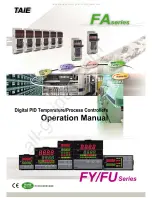
15
9.4 TROUBLESHOOTING
The ProStar is assembled with automated equipment, tested with computers, and is protected
from faults. It is usually worthwhile to troubleshoot the entire solar system for faults, since the
ProStar will generally not be the cause of a problem. Most problems will be caused by wiring
connections, batteries unable to hold a charge, or faulty loads.
CAUTIONS:
1. Troubleshooting should be done by qualified personnel.
2. A battery can cause serious damage if shorted.
3. There are no user serviceable parts, fuses or circuit breakers inside the ProStar.
4. Observe all normal precautions when working with energized circuitry.
NOTE:
If soldering is required, simply solder-through the conformal coating. The
coating is acrylic and does not affect soldering.
1. BATTERY IS NOT CHARGING
• Check the green CHARGING LED above the Solar input. With sunlight on the solar
array, this LED should be on.
• Check that the proper BATTERY TYPE has been selected.
• Check that all wire connections in the system are correct and tight. Check the
polarity (+/–) of the connections.
• Measure the solar array open-circuit voltage (disconnected from the controller) and
confirm it is normal. If the array voltage is low or zero, repair the fault in the array.
• Confirm that the load is not drawing more energy than the solar array can provide.
• If the BATTERY SENSE terminals are not used, there may be excessive voltage drops
between the ProStar and the battery. This is a common cause of undercharging
batteries. See section 6.2 to connect the Battery Sense.
• Check the condition of the battery. Determine if the battery voltage falls at night with
no load. If the battery is unable to maintain its voltage, it may be failing
• Measure the solar input voltage (during daytime) and battery voltage at the ProStar
terminals. If the voltages at the terminals are the same (within about 0.5 volts), the
solar array is charging the battery. If the solar voltage is close to open-circuit (about
20V), and the battery voltage is low, the controller is not charging the battery and
may be defective. Make sure the ProStar is not in regulation (PWM) for this test (see
section 4.0).
NOTE:
If the battery is not being fully recharged, measure the voltage at the
battery terminals on the ProStar, and then at the terminals on the battery.
This should be done at midday with full charging from the solar array
(and not in PWM regulation). If the ProStar terminals are 1 volt higher
than the battery terminals, for example, this voltage drop will cause the
battery to regulate 1 volt below its desired regulation (PWM) voltage,
and it will take longer to recharge. In this case, the SENSE terminals
should be connected to the battery for accurate charging.
2. BATTERY VOLTAGE IS TOO HIGH
• First check the operating conditions to account for temperature compensation (a
15°C / 59°F temperature will increase PWM regulation by 0.3V for a 12V battery)
and automatic equalizations.
RSPSupply - 1-888-532-2706 - www.RSPSupply.com
http://www.RSPSupply.com/p-8569-Morningstar-PS-30M-PG-Charge-Controller-12/24V-30A.aspx



































